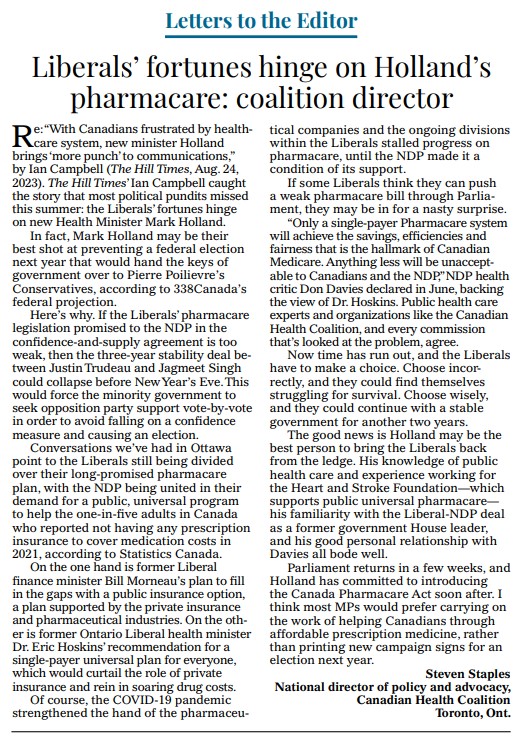With Liberals down in the polls, they need to get pharmacare right
Parliament resumes on September 18, and the Liberal government is planning to introduce legislation for pharmacare to fulfill a commitment to the NDP in exchange for its support.
Our hope is that the new Canada Pharmacare Act brings forward a public universal program, but there is still debate on the Liberal benches.
Here is a letter I submitted to The Hill Times recently, urging Liberals to get behind the best pharmacare plan, and continue making progress on other priorities shared with the NDP.
Liberals’ fortunes hinge on Holland’s pharmacare: coalition director
September 4, 2023
Re: “With Canadians frustrated by health-care system, new minister Holland brings ‘more punch’ to communications,” by Ian Campbell (The Hill Times, Aug. 24, 2023).
The Hill Times’ Ian Campbell caught the story that most political pundits missed this summer: the Liberals’ fortunes hinge on new Health Minister Mark Holland.
In fact, Mark Holland may be their best shot at preventing a federal election next year that would hand the keys of government over to Pierre Poilievre’s Conservatives, according to 338Canada’s federal projection.
Here’s why. If the Liberals’ pharmacare legislation promised to the NDP in the confidence-and-supply agreement is too weak, then the three-year stability deal between Justin Trudeau and Jagmeet Singh could collapse before New Year’s Eve. This would force the minority government to seek opposition party support vote-by-vote in order to avoid falling on a confidence measure and causing an election.
Conversations we’ve had in Ottawa point to the Liberals still being divided over their long-promised pharmacare plan, with the NDP being united in their demand for a public, universal program to help the one-in-five adults in Canada who reported not having any prescription insurance to cover medication costs in 2021, according to Statistics Canada.
On the one hand is former Liberal finance minister Bill Morneau’s plan to fill in the gaps with a public insurance option, a plan supported by the private insurance and pharmaceutical industries. On the other is former Ontario Liberal health minister Dr. Eric Hoskins’ recommendation for a single-payer universal plan for everyone, which would curtail the role of private insurance and rein in soaring drug costs.
Of course, the COVID-19 pandemic strengthened the hand of the pharmaceutical companies and the ongoing divisions within the Liberals stalled progress on pharmacare, until the NDP made it a condition of its support.
If some Liberals think they can push a weak pharmacare bill through Parliament, they may be in for a nasty surprise.
STEVEN STAPLES
“Only a single-payer Pharmacare system will achieve the savings, efficiencies and fairness that is the hallmark of Canadian Medicare. Anything less will be unacceptable to Canadians and the NDP,” NDP health critic Don Davies declared in June, backing the view of Dr. Eric Hoskins. Public health care experts and organizations like the Canadian Health Coalition, and every commission that’s looked at the problem, agree.
Now time has run out, and the Liberals have to make a choice. Choose incorrectly, and they could find themselves struggling for survival. Choose wisely, and they could continue with a stable government for another two years.
The good news is Holland may be the best person to bring the Liberals back from the ledge. His knowledge of public health care and experience working for the Heart and Stroke Foundation—which supports public universal pharmacare—his familiarity with the Liberal-NDP deal as a former government House leader, and his good personal relationship with Davies all bode well.
Parliament returns in a few weeks, and Minister Holland has committed to introducing the Canada Pharmacare Act soon after. I think most MPs would prefer carrying on the work of helping Canadians through affordable prescription medicine, rather than printing new campaign signs for an election next year.




